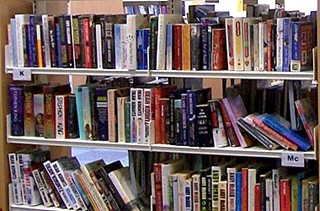
The future of our public libraries
Rex Needle
|
Libraries are now likely to be privatised by Lincolnshire County Council despite being castigated by a High Court judge earlier this year when councillors tried to withdraw funding from 32 of the 47 under their control in a bid to save £2 million on the annual budget. The proposal was challenged by campaigners who took their protest to the High Court where it was upheld. The latest plan is to put the library service out to tender after a private company has offered to run it, a move recommended by council officers but fortunately it is not they who should be running the authority but our own elected councillors although another public consultation must be held first, the last one being badly handled, so leading to the criticism by my learned friend. The entire prospect for our libraries therefore seems to be in something of a muddle as councillors thrash around for a solution whereas the best way forward would be to find the money to keep them under council control and in that way they would be safe. There must be a great deal of unidentified slack in the current spending budget of £1,099 million (2014-15) to ensure that such a valuable amenity is saved for future generations despite the propaganda we keep hearing about fewer borrowers making the service less economically viable and the authority should be continually reminded that it is not a private company that needs to make a profit to satisfy shareholders but a local authority whose task is to deliver services for the benefit of the public. It is only a few months ago that these councillors thought fit to give themselves a 25% pay increase which will cost the authority an annual £250,000 previously earmarked for improving services yet they voted by a massive majority to take the money, presumably because they decided that their own interests should come before securing a free book lending facility that has such a long and honourable tradition. There are many great men and women whose humble start in life was greatly assisted by the availability of such a service and although the current argument suggests that the Kindle and iPad have replaced the printed word, electronic gewgaws are no substitute for the thrill of opening a book and finding within its covers the information you seek, the tale to entertain or the journey of exploration you anticipated when lifting it from the library shelf. I know this feeling only too well because a major influence in my boyhood was our local library which I discovered at the age of twelve, a small wooden building little more than a hut yet containing an introduction to the world of books which could be borrowed by the week and then returned and replaced. These visits on a Tuesday evening became the highpoint of my week in a world before television and other diversions and after a pleasurable hour browsing the shelves for my regulation copies of two fiction and two non-fiction, I would return home to devour the contents well before the allotted time span had elapsed. At first, my reading was random but the librarian, a bespectacled spinster who had been my teacher at the elementary school I had recently left, soon realised that I was in earnest and began recommending authors and subjects from which I might benefit although she often frowned when I presented myself at the reception desk where she rubber stamped the outgoing volumes if I had selected something that had taken my fancy and of which she may not have approved. Nevertheless, we established what would be known today as a working relationship and soon, realising that I was becoming an avid reader, she began to turn a blind eye to the rules and without comment would allow me to take home more books than I was officially allowed, knowing that they would be read and returned within the week, an arrangement which enabled me over the next few years to become familiar with the great literary works of the age. This small, and by today’s standards, insignificant library was a turning point in my life and many others must have benefited by what it had to offer and although all of this happened in another age some seventy years ago the thirst for knowledge is undiminished. Despite the other and more immediate means of obtaining information, nothing can replace the book, not only for its binding, content and ease of use but also for its place on the bookshelf once read, a reminder of a pleasure experienced and to be taken down and savoured again at some time in the future. Our public libraries therefore should be sacrosanct, preserved from meddling bureaucracy at all costs, yet they remain under threat and it is the duty of our councillors to ensure that they continue to be available to this and future generations. From the archives: "The county council stuck their heads in the sand. They should have listened to the people of Lincolnshire and particularly the people of the Deepings where half of the people signed the petition and they still refused to listen. They should hang their heads in shame. They should immediately restore our libraries to what they were previously by using some of the £41 million they under-spent in the past year.” - county councillor Phil Dilks, speaking in July this year after the High Court in London upheld a challenge by the Save Lincolnshire Libraries campaign group over the authority’s decision to withdraw funding from 32 of its 47 libraries. WRITTEN NOVEMBER 2014 |